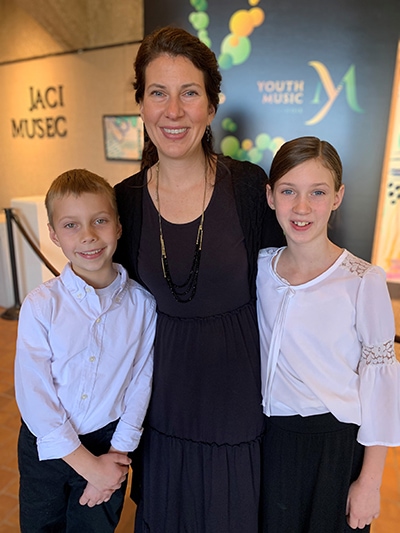Youth Music Illinois (YMI) rang in 2020 by launching the new Suzuki School of Music, the only comprehensive Suzuki program within 150 miles of Peoria. The school will initially offer lessons in violin, viola and cello for children ages four through 18. School director Laura Otto learned to play violin in the YMI program as a child and went on to study violin performance at Bradley University and Illinois State University. She is confident the program offers students much more than a music lesson.
Staying true to one of the main tenets of the Suzuki method, the school seeks first and foremost to build community. Otto is excited to be fostering a group learning environment where students look forward to lessons because it means spending time with friends. Their parents are present as well, observing the lessons and working with teachers to support and celebrate their child’s efforts. “There are many cheerleaders at the Suzuki School,” Otto says. “It’s that nurturing community that makes this so much more than just learning to play the violin.”
Suzuki’s Method
Created by Japanese violinist Shinichi Suzuki, the Suzuki method is built on the foundational belief that all children can develop musical ability. Suzuki was born in 1898 and studied in both Japan and Germany before dedicating his life to bringing music education to children after the devastation of World War II. He believed nurturing an appreciation for music at a young age would help children develop life skills like sensitivity, discipline and endurance.
Just as children learn to speak before learning to read, the Suzuki approach encourages children to develop technical competence on their instruments before being taught to read music. Suzuki teachers liken this to a toddler learning to speak at home; they hear language and begin to repeat it before learning to sound out words in a book.
Children at the Suzuki School will learn to listen and repeat music as they get comfortable holding and playing their instruments. Once they’ve established those skills, note-reading is introduced. Otto contradicts the oft-mentioned stereotype that children who learn through the Suzuki method don’t learn to read music. “We follow what we feel is a more natural sequence in the learning process,” she explains, adding that reading music is an important element of the program.
Otto—a member of the Suzuki Association of the Americas with training from Suzuki institutes in Chicago and Colorado—plans to maintain all tenets of the Suzuki philosophy at the new school. That means encouraging parents to take an active role, teaching music in the context of pieces rather than technical exercises, and frequent performance experience. “If you desire your students to love music,” says Otto, “you need to create an atmosphere that gives them a variety of experiences with music.”

Roots in Music Education
Youth Music Illinois has a long history of mentoring area youth in skills for music and life through the power of live performance. The vision for an organization made up of various youth ensembles began in 1965 with the desire to provide talented young musicians an experience beyond what could be offered in schools. Under the guidance of J. Elmer Szepessy, then-orchestra director at Peoria High School, and Patricia Hackler, founder of Peoria’s first Suzuki program, Central Illinois Youth Symphony (CIYS) was established. That original Suzuki program later moved to the Sun Foundation, where Otto was a teacher, before closing in 2012. With an attitude of inclusion and expansion, the CIYS board of directors changed the organization’s name to Youth Music Illinois in 2017.
YMI is known for attracting advanced musical talent, but Otto emphasizes that every child can express themselves through music. “It’s not just for the talented kids,” she notes. There is a common misconception that Suzuki is looking to produce the next prodigy. “Our goal,” says Otto, “is to create beautiful character in children through music.”
What the Future Holds
If successful, the Suzuki School will no doubt enrich the future of central Illinois’ music scene. Otto notes a “decrease in students studying string instruments in our area,” related to a lack of school funding and community resources supporting music education. This decline has resulted in a shortage of string players in local and national ensembles. Otto, the four other Suzuki School teachers, and the organization’s leadership are hopeful the new offering will replenish the string sections of local symphonies and orchestras beyond YMI ensembles with talented young musicians.
YMI hopes to make it easy for families to know where to go to receive quality education and community support for children interested in learning a string instrument. With regard to accessibility, there are scholarships available and YMI hopes to continue growing that aspect of their program. One of the benefits of the school’s community focus is that families will be able to connect with each other to purchase affordable, hand-me-down instruments as children outgrow sizes.
The new Suzuki School is an opportunity to increase multi-generational musical experiences in Peoria. Otto welcomes families considering the program to observe a lesson or two before making a commitment. Those families who do join in on this unique opportunity, she believes, will begin to see their children grow not only in musical ability, but in sensitivity, discipline and endurance, just as Shinichi Suzuki envisioned. PM
Learn more about Youth Music Illinois and the new Suzuki School of Music at youthmusicillinois.org.



